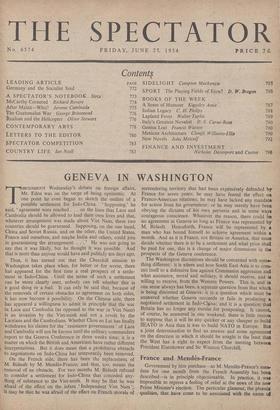GENEVA IN WASHINGTON
THROUGHOUT Wednesday's debate on foreign affairs, Mr. Eden was on the verge of being optimistic. At one point he even began to sketch the outline of a possible settlement for Indo-China. ' Supposing,' he said, ' agreement were reached . . . on the lines that Laos and Cambodia should be allowed to lead their own lives and that, whatever arrangement was made about Viet Nam, these two countries should be guaranteed. Supposing, on the one hand, China and Soviet Russia, and on the other, the United States, France and ourselves, and maybe India and others, could join in guaranteeing the arrangement. . . . ' He was not going to say that it was likely, but he thought it was possible. And that is more than anyone would have said publicly ten days ago.
Thus, it has turned out that the Churchill mission to Washington takes place when, for better or for worse, there has appeared for the first time a real prospect of a settle- ment in Indo-China. Until the terms of such a settlement can be more clearly seen, nobody can tell whether this is a good thing or a -bad. It can only be said that, because of the removals of certain obstacles to agreement on both sides, it has now become a possibility. On the Chinese side, there has appeared a willingness to admit in principle that the war in Laos and Cambodia (as opposed to the war in Viet Nam) is an invasion by the Viet-minh and not a revolt by the Laotians and the Cambodians. Whether Chou en Lai has finally withdrawn his claims for the ' resistance governments ' of Laos and Cambodia will not be known until the military commanders report to the Geneva Conference in three weeks time; it is a matter on which the British and Americans have rather different interpretations. But it does mean that a prohibitive obstacle to negotiations on Indo-China has temporarily been removed.
On the French side, there has been the replacement. of M. Bidault by M. Mendes-France; and that, too, means the removal of an obstacle. For two months M. Bidault refused to consider a settlement for Indo-China that conceded any- thing of substance to the Viet-minh. It may be that he was afraid of the effect on the infant ' Independent Viet Nam'; it may be that he was afraid of the effect on French morale of surrendering territory that had been expensively defended by' France for seven years; he may have feared the effect on Franco-American relations; he may have lacked any mandate for action from his government; or he may merely have been obeying the dictates of his own perverse and in some ways courageous conscience. Whatever the reason, there could be no agreement at Geneva so long as France was represented by M. Bidault. Henceforth, France will be represented by a man who has bound himself to achieve agreement within a month. And as it is France, not Britain or America, that must decide whether there is to be a settlement and what price shall be paid for one, this is a change of major dimensions in the prospects of the Geneva conference.
The Washington discussions should be concerned with some- thing different: it is where and how South East Asia is to com- mit itself to a defensive line against Communist aggression and what assistance, moral and military, it should receive, and is willing to receive, from the Western Powers. This is, and in one sense always has been, a separate question from that which is being discussed at Geneva; it is a question which must be answered whether Geneva succeeds or fails in producing a negotiated settlement in Indo-China; and it is a question that Britain has no longer any excuse for postponing. It cannot, of course, be answered in one weekend; there is little reason to suppose that it will be any quicker or any cheaper to build SEATO in Asia than it was to build NATO in Europe. But a joint determination to find an answer and some agreement on the direction in which it should be sought is the least that the West has a right to expect from the meeting between President Eisenhower and Sir Winston Churchill.


































 Previous page
Previous page